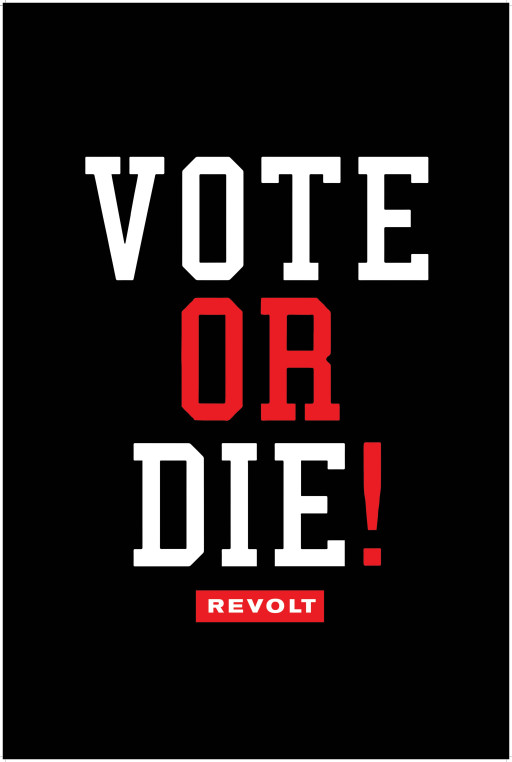
Revolt TV Vote or Die! Wild Posting
Revolt TV conducted a 2020 wild posting campaign in major markets including Los Angeles and New York, in collaboration with Sean \"Diddy\" Combs, to revive his \"Vote or Die!\" initiative for the presidential election.
INGLEWOOD, Calif., July 13, 2023 (Newswire.com) - DASH TWO, an award-winning media buying agency in Inglewood, California, recently celebrated an impressive milestone, hitting 15 years of Wild Posting®.
To celebrate this exciting anniversary, DASH TWO combed through the many things it has done and picked its 100 favorite Wild Posting campaigns in that time, compiling them along with a writeup about each.
As DASH TWO combed through all these campaigns (which involve street-level advertising featuring paper or vinyl posters fastened to construction barricades and sites or sides of buildings, done for music, fashion and beauty, politics, travel, food and beverage, and more), the team reminisced about everything the company has learned since starting in 2008. And they all realized: There would be value in passing on those lessons.
So DASH TWO put together this list of 10 lessons learned in 15 years of Wild Posting. It's essential reading for anyone who wants to understand the advertising landscape better or gain insight into what makes a great campaign from the company that literally owns the trademark on the term "Wild Posting."
Before diving in, a few observations to set the scene.
First, the social element has become much more important over the past decade and a half, as people would expect. Hashtags have been an essential element of campaigns since 2010, when Twitter really caught on, and augmented reality became a thing the past five years.
Second, this has become a surprisingly pervasive medium. More and more industries and verticals are using it (for reasons outlined below).
And third, while historically the action known as flyposting or wheatpasting was done unpermitted as a form of guerrilla/street advertising, these days, most campaigns are permitted. Landlords recognize that selling space on the side of an abandoned building is a better use of their property, making this medium perfectly legal.
And now, 10 lessons from Wild Posting.
1. Creative Makes a Difference: The Simpler the Better
Sometimes the image says it all — NBA player James Harden's face, the Playboy logo, the shaggy-haired Guns 'N Roses skull. And hey, we're not above showing a little skin in service to a worthy message — the Tamara Mellon, Isle of Paradise Body and Natori campaigns pop to mind. These simple, straightforward messages draw tons of attention.
2. QR Codes Are Not Always Good
QR codes were briefly popular in the early 2010s and then made a comeback during the pandemic, when everything went touchless. We don't always love them, though — while they're a solid replacement for a URL, they can mess with the flow of the creative, which is so key to a great campaign. There aren't many QR codes on our top 100 picks.
3. Cut-Outs and Die-Cuts Break Through Clutter
When creative is key, offering the eye something unexpected makes an ad pop. Cut-outs and die-cuts provide unexpected shapes, differing from what's around them on a barricade or building side. Their unique forms make them perfect when trying something a little different.
4. Alternating Poster Colors Helps Stand Out
The name of the game is standing out amidst a crowded background. Creating a checkered pattern with different-colored posters, alternating them along the surface, offers a surefire strategy. Go with two colors or try for many to create a rainbow effect.
5. You Can't Treat All Markets the Same
While advertisers often run the same ad in different markets on TV, they can't do that for this medium. Each market has differences in where to post, what creative resonates with pedestrians, the local zoning rules and more. Creatives need to plan for each market.
6. It Is an Exceptional Branding Medium
While a lot of people think of events (like album drops or museum exhibits) when they think of flyposting, it also works for branding. Showcase the things that define your company and place you apart (and ahead!) of competitors. People begin to associate these traits with you, growing awareness of your brand.
7. There's More Expression in the Creative for Wild Posting
The posters are not big, but there is room for nuance. Using a different color, arranging a few words just right or creating contrasts can tell a story as effectively as any medium — with more room for creativity.
Here are a few fantastic examples:
8. Words Are Nice But Not Always Necessary
We buy into the expression "a picture is worth 1,000 words." Sometimes all that's needed to get the message across is a really powerful image. DASH TWO tries to keep words minimal, delivering the clients' big points mainly through visuals instead of verbs, as in the case of this Lucky Lager posting, another for Off-White Shoes and this from Spell Clothing.
9. It Is Less Regulated Than More Traditional Formats
We adore billboards — but they are pretty regulated. For instance, QR codes aren't allowed on billboards, and certain industries, like cannabis and alcohol, are banned from posting boards near schools and churches. With Wild Posting, which started when this was known as a largely lawless guerrilla medium, there are no such restrictions. It's freeing, and it's fun.
10. Wild Posting is Wildly Cost Effective
Got a modest budget? No problem. Marketers can still fund a great campaign. The low cost of the posters and wheatpaste used to affix them to walls and barricades gives a great return on investment. And marketers get good results for a low price.
Contact Information:Gino Sesto
President
[email protected]
310-621-9848
Related Files
TBRO-0048_haring_wildposting_broadway_r10v1_mm-1.jpg
Revolt PDF proof.jpg
Original Source: DASH TWO Spotlights Top 100 Wild Posting Campaigns in the Last 15 Years